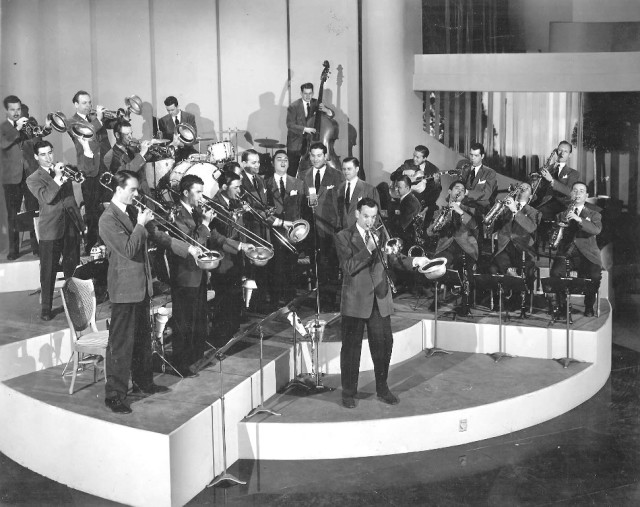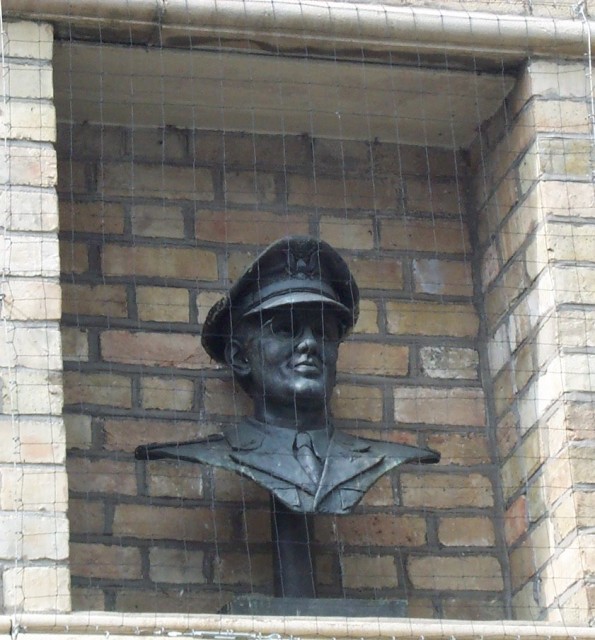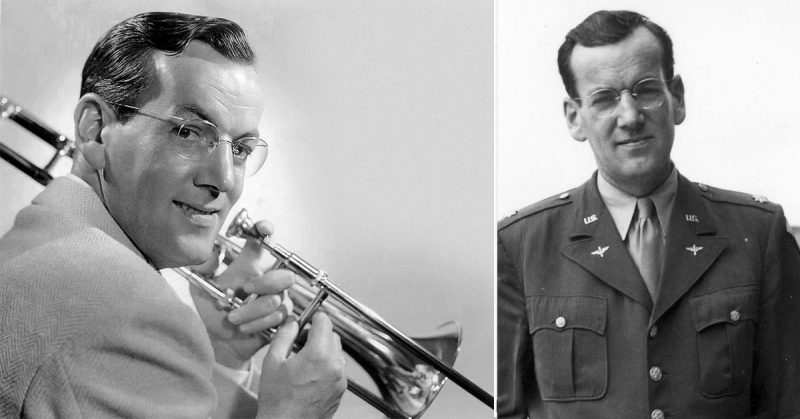Glenn Miller was an American musical icon and, in many ways still is. Turn on any one of his big band-style songs from the 1930’s and 40’s like “Moonlight Serenade,” “In the Mood,” or “Chattanooga Choo Choo” and you’ll probably find it familiar.
Miller’s music helped define the age in the music-loving world West of the territory controlled by the Reich. Hitler wouldn’t allow any jazz, swing, blues, you-name-it-along-with-a-racial-insult music from the African-American roots-developed popular genres of the century to play on German radios.
Maybe that’s why Miller felt so compelled to join the U.S. Army, and eventually, the Army Air Force, to play music for the troops and as anti-Nazi propaganda. Until Miller’s mysterious disappearance, he helped boost morale in over 800 performances for troops in Britain before or in between the battles they faced against Nazi Germany.
Here’s a playlist of Glenn Miller’s Army Air Force Band recordings on Youtube. If you have audio available, let it play to take you back in time for this story of fame, patriotism, morale, propaganda, and mystery.
Glenn Miller and His Orchestra rose to fame in the late 1930’s after Miller himself had spent well over a decade, after dropping out of the University of Colorado, playing trombone, composing music, assembling orchestras/bands and connecting with big time musical stars like Bing Cosby and Judy Garland.
Their sound became a popular hit on the radios and in shows for huge audiences though it was often criticized by jazz and other genre musicians at the time and to this day. Having the saxophone play what was often the clarinet’s role in these days was, in Miller’s own reasoning, one of the main things that set them apart from other contemporary bands.
Miller got big, Hollywood big. In 1942, before he volunteered for the U.S. Army at the age of 38, Miller was making $15,000-20,000 per week—a bafflingly high income. But he gave this up, apparently so dedicated to bringing some mood-boosting music to the troops. He had to persuade the Army to accept him after the Navy had already said no.

A key part of his mission was to create a modernized army band. Many traditionally-minded officers in the Army were hesitant to let this happen, but Miller and the clout he carried won enough over that his work went ahead. In the song “St. Louis Blues March,” (number 12 on the playlist linked to earlier) which was played by Miller and the 50-piece Army Air Force Band, the traditional military march was fused with jazz and blues.
Not only was the Band’s music a huge lift to troops in performances on the radio waves of the American Forces Network, it was used as a propaganda tool against the Germans. They even recorded versions of songs with lyrics sung in German by Johnny Desmond. Sometimes, Miller would speak about the war in German.
Meanwhile, in Germany, many people would secretly play all kinds of jazz and other music from America, like in the 1993 movie Swing Kids. This, of course, was a dangerous form of entertainment in the Nazi era.
Any of these dissidents who had gotten their hands on records from Glenn Miller and His Orchestra would have instantly recognized Miller’s voice speaking (and in German, no less!) and the sound of his music.
There are also stories of Luftwaffe pilots scanning through their radios, trying to catch a snippet of Miller’s music before dropping their payloads on London.
On December 15th, 1944, Miller flew from England, heading to Paris to play for the soldiers in the liberated city. But he never arrived. In fact, he and the plane, along with fellow passenger Lieutenant Colonel Norman Baessell and pilot John Morgan, vanished, never to be seen again.
Of course, there are many stories as to what fate befell Miller and his travel companions, but none that soothed the grieving and desperately confused Miller family, according to nephew John Miller.
Miller, afraid of flying in planes, had boarded a small U.S. Air Force UC-65 Norseman on a day with bad weather and somewhere over the English Channel, disappeared.

One possible answer to this mystery is the testimony offered (though years later in the 1980’s) by a British Royal Air Force navigator named Fred Shaw who had been on an aborted mission to bomb a German target the same day. The bombers had been returning due to poor weather and had to jettison their payload over the Channel before landing back home in England.
Shaw claimed he saw a Norseman blasted out of the sky by a shock-wave from one of the explosions and into the water with clearly no survivors. Although, this story is contested by claims that the Norseman’s flight plan would have purposefully avoided an area where bombs were being unloaded.
Another tale claims that Miller perished while on a secret mission to meet with dissident German officers who would help covertly spread his music through Germany to help propel an uprising and topple Hitler’s rule.
A more simple explanation comes from a slew of confirmed reports on the engines of Norseman planes failing because the carburetor froze up in cold weather.
Whatever the true fate of Miller, his music had a deep impact on American and European culture and helped Allied troops’ morale in a terrible war. Keep listening to the Army Air Force Band playlist, close your eyes and imagine listening to it in the rec hall, waiting to head back to Normandy, thinking of home.
If you’re an American soldier, you might be listening, smiling, and thinking something like one of Miller’s more propagandistic phrases: “America means freedom and there’s no expression of freedom quite so sincere as music” (source: wikipedia.org).
By Colin Fraser for War History Online
